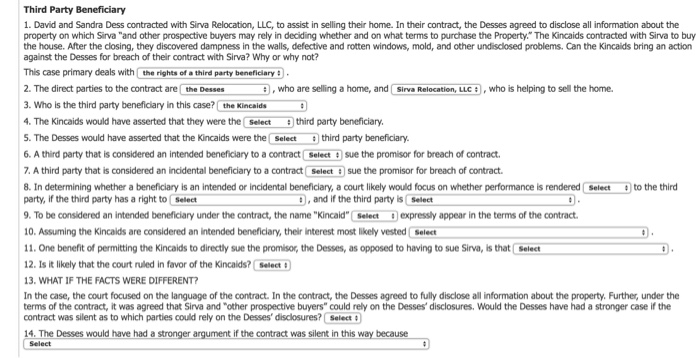Third Party Beneficiary 1. David and Sandra Dess contracted with Sirva Relocation, LLC, to assist in selling their home. In their contract, the Desses agreed to disclose all information about the property on which Sirva "and other prospective buyers may rely in deciding whether and on what terms to purchase the Property. The Kincaids contracted with Sirva to buy the house. After the closing, they discovered dampness in the walls, defective and rotten windows, mold, and other undisclosed problems. Can the Kincaids bring an action against the Desses for breach of their contract with Sirva? Why or why not? This case primary deals withthe rights of a third party beneficiary 2. The direct parties to the contract arethe Desses,who are selling a home, and Sirva Relocation, LLC ,who is helping to sell the home 3. Who is the third party beneficiary in this case?the Kincaids 4. The Kincaids would have asserted that they were theSelectthird party beneficiary. S. The Desses would have asserted that the Kincaids were the Select third party beneficiary. 6. A third party that is considered an intended beneficiary to a contract Select sue the promisor for breach of contract. 7. A third party that is considered an incidental beneficiary to a contract Select sue the promisor for breach of contract 8. In determining whether a beneficiary is an intended or incidental beneficiary, a court likely would focus on whether performance is rendered Select party, if the third party has a right to Select to the third a), and if the third party is Select 9To be considered an intended beneficiary under the contract, the name "Kincaid" | Select -O expressly appear in the terms of the contract. 10. Assuming the Kincalds are considered an intended beneficiary, their interest most likely vested Select 11. One benefit of permitting the Kincaids to directly sue the promisor, the Desses, as opposed to having to sue Sirva, is that Select 12. Is it likely that the court ruled in favor of the Kincaids?Select 3. WHAT IF THE FACTS WERE DIFFERENT In the case, the court focused on the language of the contract. In the contract, the Desses agreed to fully disclose all information about the property. Further, under the terms of the contract, it was agreed that Sirva and "other prospective buyers" could rely on the Desses disclosures. Would the Desses have had a stronger case if the contract was silent as to which parties could rely on the Desses' disclosures?Select 14. The Desses would have had a stronger argument if the contract was silent in this way because Third Party Beneficiary 1. David and Sandra Dess contracted with Sirva Relocation, LLC, to assist in selling their home. In their contract, the Desses agreed to disclose all information about the property on which Sirva "and other prospective buyers may rely in deciding whether and on what terms to purchase the Property. The Kincaids contracted with Sirva to buy the house. After the closing, they discovered dampness in the walls, defective and rotten windows, mold, and other undisclosed problems. Can the Kincaids bring an action against the Desses for breach of their contract with Sirva? Why or why not? This case primary deals withthe rights of a third party beneficiary 2. The direct parties to the contract arethe Desses,who are selling a home, and Sirva Relocation, LLC ,who is helping to sell the home 3. Who is the third party beneficiary in this case?the Kincaids 4. The Kincaids would have asserted that they were theSelectthird party beneficiary. S. The Desses would have asserted that the Kincaids were the Select third party beneficiary. 6. A third party that is considered an intended beneficiary to a contract Select sue the promisor for breach of contract. 7. A third party that is considered an incidental beneficiary to a contract Select sue the promisor for breach of contract 8. In determining whether a beneficiary is an intended or incidental beneficiary, a court likely would focus on whether performance is rendered Select party, if the third party has a right to Select to the third a), and if the third party is Select 9To be considered an intended beneficiary under the contract, the name "Kincaid" | Select -O expressly appear in the terms of the contract. 10. Assuming the Kincalds are considered an intended beneficiary, their interest most likely vested Select 11. One benefit of permitting the Kincaids to directly sue the promisor, the Desses, as opposed to having to sue Sirva, is that Select 12. Is it likely that the court ruled in favor of the Kincaids?Select 3. WHAT IF THE FACTS WERE DIFFERENT In the case, the court focused on the language of the contract. In the contract, the Desses agreed to fully disclose all information about the property. Further, under the terms of the contract, it was agreed that Sirva and "other prospective buyers" could rely on the Desses disclosures. Would the Desses have had a stronger case if the contract was silent as to which parties could rely on the Desses' disclosures?Select 14. The Desses would have had a stronger argument if the contract was silent in this way because







